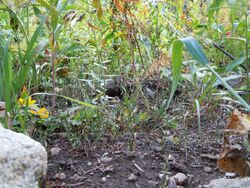Biology:Polygonum douglasii
| Polygonum douglasii | |
|---|---|

| |
| Scientific classification | |
| Kingdom: | Plantae |
| Clade: | Tracheophytes |
| Clade: | Angiosperms |
| Clade: | Eudicots |
| Order: | Caryophyllales |
| Family: | Polygonaceae |
| Genus: | Polygonum |
| Species: | P. douglasii
|
| Binomial name | |
| Polygonum douglasii Greene 1885
| |
| Synonyms[2] | |
| |
Polygonum douglasii is a species of flowering plant in the knotweed family known by the common name Douglas's knotweed. It is native to much of northern and western North America, where it can be found in many types of habitat, including disturbed areas. It has been found in Canada from British Columbia north to Yukon and east as far as Québec, and in the United States as far south as California , New Mexico, Iowa, and New York.[3]
Polygonum douglasii is known as a species complex, as there are many subspecies that may be better treated as species in their own right.[4][5][1]
Polygonum douglasii is variable in morphology and the subspecies are often difficult to distinguish. In general, plants in this complex are annual herbs growing erect to maximum heights anywhere between 3 and 80 centimeters (1.2–32 inches) with thin, angular stems. High-elevation plants are smaller and sometimes trailing on the surface of the ground. The leaves are linear or widely lance-shaped, sometimes falling away to leave the plant mostly naked in flowering, or reduced to tiny scales at the stem tips. The flowers are a few millimeters long, pink to white, sometimes remaining closed or opening together in a cluster.[6][2]
References
- ↑ 1.0 1.1 Greene, Edward Lee. 1885. Bulletin of the California Academy of Sciences 1(3): 125–126
- ↑ 2.0 2.1 The Plant List, Polygonum douglasii Greene
- ↑ Biota of North America Program 2014 state-level distribution map
- ↑ Flora of North America
- ↑ Costea, M. & F. J. Tardif. (2005). Taxonomy of the Polygonum douglasii (Polygonaceae) complex with a new species from Oregon. Brittonia 57:1 1–27.
- ↑ Flora of North America, Polygonum douglasii Greene, 1885. Douglas's knotweed, renouée de Douglas
External links
- Jepson Manual Treatment
- Calphotos Photo gallery, University of California
- photo of herbarium specimen at Missouri Botanical Garden, collected in Idaho in 2009
Wikidata ☰ Q7158242 entry
 |

